The $60 CPU Question: AMD Athlon 200GE or Intel Pentium Gold G5400? A Review
by Ian Cutress on January 14, 2019 8:00 AM ESTCPU Performance: Encoding Tests
With the rise of streaming, vlogs, and video content as a whole, encoding and transcoding tests are becoming ever more important. Not only are more home users and gamers needing to convert video files into something more manageable, for streaming or archival purposes, but the servers that manage the output also manage around data and log files with compression and decompression. Our encoding tasks are focused around these important scenarios, with input from the community for the best implementation of real-world testing.
All of our benchmark results can also be found in our benchmark engine, Bench.
Handbrake 1.1.0: Streaming and Archival Video Transcoding
A popular open source tool, Handbrake is the anything-to-anything video conversion software that a number of people use as a reference point. The danger is always on version numbers and optimization, for example the latest versions of the software can take advantage of AVX-512 and OpenCL to accelerate certain types of transcoding and algorithms. The version we use here is a pure CPU play, with common transcoding variations.
We have split Handbrake up into several tests, using a Logitech C920 1080p60 native webcam recording (essentially a streamer recording), and convert them into two types of streaming formats and one for archival. The output settings used are:
- 720p60 at 6000 kbps constant bit rate, fast setting, high profile
- 1080p60 at 3500 kbps constant bit rate, faster setting, main profile
- 1080p60 HEVC at 3500 kbps variable bit rate, fast setting, main profile
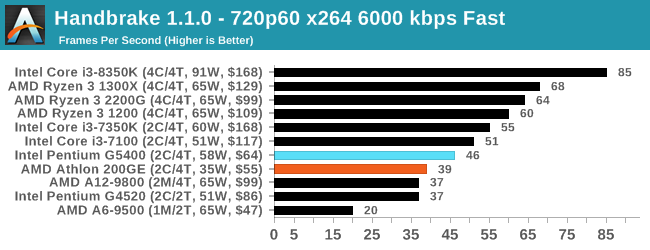
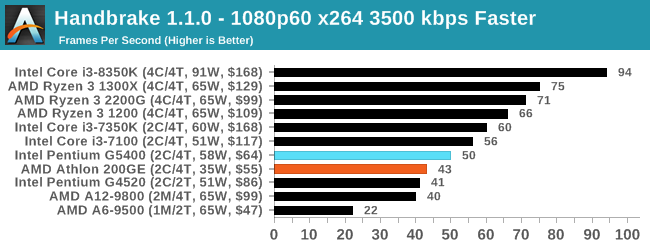
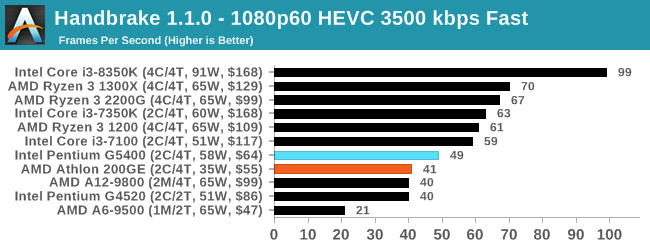
Handbrake manages to use the Pentium resources and higher frequency better, scoring about a 15% win in every circumstance.
7-zip v1805: Popular Open-Source Encoding Engine
Out of our compression/decompression tool tests, 7-zip is the most requested and comes with a built-in benchmark. For our test suite, we’ve pulled the latest version of the software and we run the benchmark from the command line, reporting the compression, decompression, and a combined score.
It is noted in this benchmark that the latest multi-die processors have very bi-modal performance between compression and decompression, performing well in one and badly in the other. There are also discussions around how the Windows Scheduler is implementing every thread. As we get more results, it will be interesting to see how this plays out.
Please note, if you plan to share out the Compression graph, please include the Decompression one. Otherwise you’re only presenting half a picture.
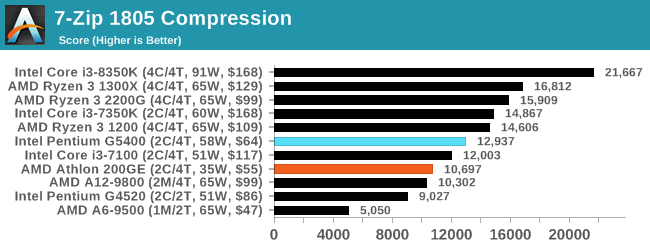
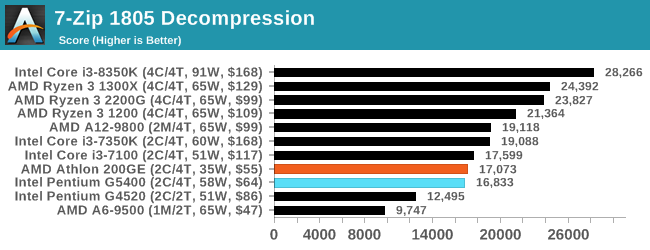
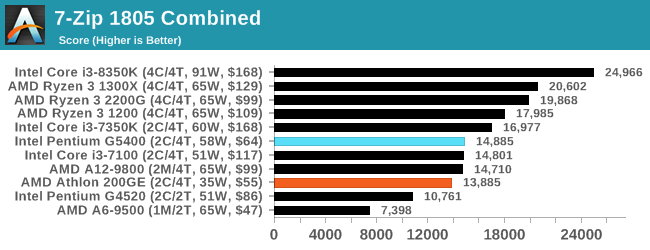
7-zip is an interesting test, given that Intel usually wins Compression but AMD wins Decompression. The same occurs here, however Intel wins the first test by a lot and AMD wins the second test by a small margin. Overall win to Intel here.
WinRAR 5.60b3: Archiving Tool
My compression tool of choice is often WinRAR, having been one of the first tools a number of my generation used over two decades ago. The interface has not changed much, although the integration with Windows right click commands is always a plus. It has no in-built test, so we run a compression over a set directory containing over thirty 60-second video files and 2000 small web-based files at a normal compression rate.
WinRAR is variable threaded but also susceptible to caching, so in our test we run it 10 times and take the average of the last five, leaving the test purely for raw CPU compute performance.
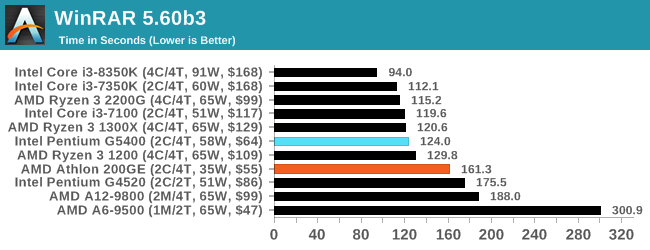
As a mixed workload that involves memory, this result would seem hard to predict given the two CPUs being tested. It ended up a clear win for Intel however – that extra core frequency in the G5400 mattered more than the main memory frequency of the 200GE.
AES Encryption: File Security
A number of platforms, particularly mobile devices, are now offering encryption by default with file systems in order to protect the contents. Windows based devices have these options as well, often applied by BitLocker or third-party software. In our AES encryption test, we used the discontinued TrueCrypt for its built-in benchmark, which tests several encryption algorithms directly in memory.
The data we take for this test is the combined AES encrypt/decrypt performance, measured in gigabytes per second. The software does use AES commands for processors that offer hardware selection, however not AVX-512.
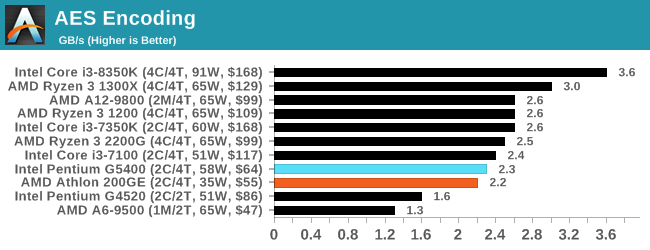










95 Comments
View All Comments
perdomot - Saturday, January 19, 2019 - link
How does the author of this article not know that the price of the G5400 is in the $120+ range? At that price, the 1300x would be the appropriate comparison and it clearly smokes the Intel cpu in the benches. The author needs a reprimand for this poor work.mito0815 - Thursday, January 24, 2019 - link
Oh ffs. Been a while since I was around, and OH WOULD YOU LOOK AT THAT, the AMD shilling and -fanboyism in the comments has become just as unbearable as I'd imagined. People, he set up two budget CPUs on a comparable level (AMD strong in GPU, Intel a tad bit stronger in CPU performance & clock) against each other...nothing more, nothing less. Store prices for Intel CPU's being so inflated isn't really Intel's fault now, is it? The intended stock prices are still very much comparable. By your logic, AMD would've not been quite the price/performance god you all worship during the mining GPU price explosion now, would it?But no, all you guys want is an article with some AMD CPU coming out on top, no matter how it's done. Get over yourselves. By the looks of it, while GPU is still a sore point with AMD, Ryzen 2 seems to look good so far. Wait for that and don't go all rampant now.
kkilobyte - Saturday, January 26, 2019 - link
The article title starting with: "The $60 CPU question", it is not unreasonable 'fanboi-ism' to expect that the article is comparing CPUs costing, well, around $60.And the issue is not about Intel being guilty or not of the current high prices.
The problem is that the article draws conclusions that simply don't match reality, precisely because it doesn't adress the current discrepancy between the street prices and the manufacturer's suggested one. It would have taken a single paragraph to explain that.
My issue about the article is that, unlike what you are writing, it doesn't compare CPUs of similar (price) level. What it does is comparing CPUs of similar *theorical* price levels, but draws a conclusion as if those were the commonly seen street prices. This is dishonest and misleading.
watersb - Saturday, February 9, 2019 - link
Thanks for this review. I usually build low-end systems (PCs for family members), buy off-lease enterprise stuff (test servers), or used Apple or Lenovo gear (rebuilds and workstation projects).Budget gamng gear for the kids, then help them upgrade graohics card later, seems to be the one remaining path to "gaming enthusiast" hobby.
Everyone else gets a Chromebook. And a Raspberry Pi.
Dr Hasan - Tuesday, November 26, 2019 - link
Why are all products are old and prices too. Athlon 3000g is 50$ rayzen 2200g is less than 100$